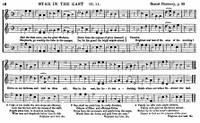
Freedom and Discipline

I took piano lessons for three years, trumpet for two; I have been playing bass since my sophomore year of high school and I can barely read the treble clef, and the bass might as well be Sanskrit.
It’s not that I’ve ever gotten tired of playing music. And it’s not the difficulty either of theory or technique that has kept me musically illiterate. In every situation it was my lack of discipline that kept me from understanding some of the most basic elements of musicianship. I couldn’t be bother to devote myself to those things, and now I’m a hack.
I didn’t have a good deal of encouragement to discipline myself growing up – I was one of the last people I knew taking music lessons, a kind of curiosity to my elementary school friends. By the time I got to high school I was one of the few people doing anything more complex than playing Nintendo. Why, my friends wondered, with teachers and parents always trying to regulate our behavior and schedule our time would someone ever be bothered to discipline himself and make routines of spare time?
Often we do not know how to properly think of discipline, and the
term is usually defined in two incorrect and unchristian ways. On the
purportedly family values, pro-discipline side of things, people need
to be disciplined for society to function properly, with the absolute
minimum of fuss. Others think that discipline is a word to describe
the harm that people are willing to do to prevent individuals from
developing themselves. A person should be freed as much as possible
from society’s restrictions so they may, through an apparently proven
process, find out who they really are.
If we leave discipline at that, one side is clearly abusive and the
other side is irresponsible. Not surprisingly, both sides are set
against the very goals they aim to achieve. A Christian idea of
discipline is entirely different. Discipline is an invitation to
participate in something wonderful and beautiful. Discipline, both of
the self and of those under your care, is ultimately an invitation to
be yourself (and for those under you to be themselves). By asserting
your individuality without a group, you become a nobody, which is just
as much a risk as melting seamlessly into a mass. With music, I failed
to discipline myself – now I have difficulty participating at anything
more than an elementary level of music. My freedom to play is
limited. In this particular aspect of life, I’ve lost the ability to
be an individual and participate (effectively anyhow) in community.
This isn’t cute thinking about how we relate to each other – it has
enormous psychological and spiritual implications. Too often our idea
of spiritual growth involves us struggling to make ourselves into our
friends. My friend excels in a particular area that I see as crucial
to being a Christian, so my first reaction is to feel bad about what I
am doing and seek to imitate him. Sometimes this is good, especially
as we are to try to outdo each other in service. But too often we go
further than a little imitation into straight duplication. Our goal is
not to discipline ourselves into looking like each other, but into
looking like Christ. When we imagine that our friends have the answer,
that they get it and we don’t, we cease developing the body of Christ
and start deforming it.
We are called to serve Christ and to serve him as a body. This
means working together, but it doesn’t mean looking the same. If we
are to meet a wide variety of needs in Austin, among ourselves, our
friends, and the larger community, we must be willing to discpline
ourselves in the cultivation of good habits and dispositions of
service. As we are each individuals, this will look different and our
hearts will be pulled towards different needs in the community. As we
are a body, we will strive to meet these needs together. In the
process we will discover a true and excellent freedom – not the freedom
so often discussed today (which is mostly a joke).